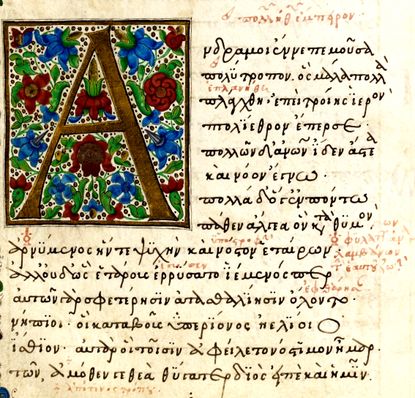What happens when women translate the Classics
Suddenly The Odyssey takes on a whole new meaning

"Tell me about a complicated man." This first line of Emily Wilson's translation of the Ancient Greek epic poem The Odyssey raised a lot of eyebrows when it was published in 2017. The translation reinvigorated the interest in the story of Odysseus and his 10-year struggle to return home to his wife Penelope and their son Telemachos on the island of Ithaca, after having fought in the Trojan War. Wilson is so far the only woman to publish a translation of The Odyssey in English, a translation considered by many as groundbreaking.
Wilson might be the first woman to translate The Odyssey into English, but she's not the first woman to translate an Ancient Greek text into a contemporary language. With her translation, Wilson joins the ranks of women who have broken gender barriers to give their voices to the Classics. Does the translator's gender influence the interpretation of a text?
A translation is the result of a series of choices that the translator makes. No other story demonstrates this better than The Odyssey, in which scenes can be read from several different perspectives, and words and phrases can be translated in a number of ways. Take the poem's very first line, for example. The first line of a text is important. It sets the tone and direction for everything that follows.
Subscribe to The Week
Escape your echo chamber. Get the facts behind the news, plus analysis from multiple perspectives.

Sign up for The Week's Free Newsletters
From our morning news briefing to a weekly Good News Newsletter, get the best of The Week delivered directly to your inbox.
From our morning news briefing to a weekly Good News Newsletter, get the best of The Week delivered directly to your inbox.
Wilson's translation of the first line of The Odyssey attracted attention because she called Odysseus "complicated," when the majority of English translations call him either "resourceful" or "a man of many turns."
In an interview with The New York Times Magazine, Wilson reveals yet another alternative translation of that first line, which she decided not to use. Instead of calling Odysseus a "complicated man," she could have called him a "straying husband" and still have been true to the original Greek. Traditionally, The Odyssey is read as the story of Odysseus struggling against the gods and the elements, who prevent him from returning home to Ithaca. They force him to encounter monsters, such as the Cyclops, the Sirens, and Scylla and Charybdis. They hold him captive on Calypso's island for seven of the 10 years that it takes him to return from the Trojan War.
With the translation of Odysseus as the straying husband, these supernatural adventures become excuses, especially when considering that they are told by Odysseus himself to repay the hospitality of Alcinoos, king of the Phaeacians, when Odysseus is already on his way to Ithaca. Once back on Ithaca and disguised as a beggar, Odysseus tells people a different story. Now he's a family man from Crete who fought in the Trojan War before he went to Egypt. There, he became a rich man but lost everything he owned to a Phoenician scoundrel.
When The Odyssey is translated, usually the stories Odysseus tells on Ithaca are considered lies, and his supernatural stories at the court of Alcinoos are considered the truth. But if Odysseus indeed were a straying husband, the situation could very well be the reverse. In the end, though, the point is moot. Wilson chose to keep the story as it was.
Sign up for Today's Best Articles in your inbox
A free daily email with the biggest news stories of the day – and the best features from TheWeek.com
For centuries, translating texts from one language to another has been the pursuit of both men and women. But, according to Julie Candler Hayes, a professor of French and author of Translation, Subjectivity, and Culture in France and England, 1600-1800, there is a catch. Women were expected to translate works of their contemporaries, while translating the Classics was men's work. During the 17th and 18th centuries in Europe, translations of the Classics became a way of defining a national language for the developing State. In other words, translating the Classics was considered an important part of nation building, while translating contemporaries was little more than a pastime.
Translations were acceptable work for women because of the dependency of the translation on the original text. By definition, a translation can't exist without an original to lean on, the way a woman was thought to need a man.
Candler also points out that translations became a way for women to create and sustain intellectual networks and participate in intellectual debates. They wrote as women in their own names, not having to publish anonymously or under a male pseudonym. They translated other women's work and dedicated their own work to other women. This way, translations developed into a community and support system for women intellectuals.
This community was upheld in the preface and commentary of the translations. To translate is to interpret. For a reader to understand the meaning of the interpretation it needs to be explained, which the translator does in the preface and the commentary. Women translators took this opportunity to use the preface and commentary as a platform from which to engage in criticism, an arena that for a long time was reserved exclusively for men.
Among the early-modern women who translated the Classics was Anne Lefébvre Dacier (1654–1720), the first woman to translate The Odyssey from Greek to French and one of the most respected Classicists of her time. Even though she and Alexander Pope (1688–1744) were in a feud at the time of her death, Pope is known to have used Dacier as the foundation for his own influential English translations of Homer.
In her line-by-line commentary to The Odyssey, Dacier mocks her male colleagues for using bombastic language in their translations in contrast to Homer's straightforward and humble poetry. Their intention, Dacier says, is to elevate themselves above the Greek original. Dacier's words echo through the centuries and can be heard in Wilson's translator's notes where she says that her translation "avoids trumpeting its own status with bright, noisy linguistic fireworks." This statement is Wilson's swipe at the English tradition established with Pope, and with whom she openly breaks.
Dedicated to her "daughters, Imogen, Psyche, and Freya," Wilson's translation is part of a long tradition of women intellectuals taking on the Classics on their own terms, and in the process, creating a community of and for themselves. The translations by Dacier and Wilson differ from those of their male counterparts in details and tone, but not in essence. Instead, it is the work they choose to translate that becomes the gender-political act.
Want more essential commentary and analysis like this delivered straight to your inbox? Sign up for The Week's "Today's best articles" newsletter here.
Create an account with the same email registered to your subscription to unlock access.
-
 The growing thirst for camel milk
The growing thirst for camel milkUnder the radar Climate change and health-conscious consumers are pushing demand for nutrient-rich product – and the growth of industrialised farming
By Harriet Marsden, The Week UK Published
-
 'Good riddance to the televised presidential debate'
'Good riddance to the televised presidential debate'Instant Opinion Opinion, comment and editorials of the day
By Harold Maass, The Week US Published
-
 Caitlin Clark the No. 1 pick in bullish WNBA Draft
Caitlin Clark the No. 1 pick in bullish WNBA DraftSpeed Read As expected, she went to the Indiana Fever
By Peter Weber, The Week US Published